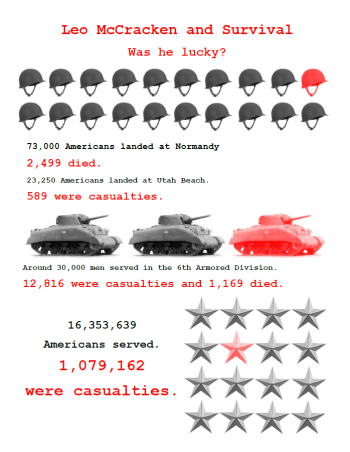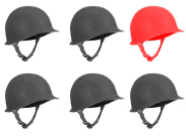“Mortality,” Leo McCracken (WWII-070)
By Austyn Szempruch, Intern
 Listen: Oral history interview clip at UFDC with Leo McCracken 00:37
Listen: Oral history interview clip at UFDC with Leo McCracken 00:37
A reality that many people fear to acknowledge today, mortality was all too real for veterans of World War II. Leo McCracken, now a United States Army veteran, was assigned to the 128th Armored Field Artillery Battalion, 6th Armored Division. Years after the war, he recounts his experiences with death while on assignment in the European Theatre. Joining with General George Patton’s Third Army, McCracken caught his first glimpse of death when the army moved through France.
At the sight of German soldiers killed by the United States’ Air Force, he described with horror the yellow color their bodies had turned and how they looked like dolls from atop the American tanks. He commented how, “The reality of war hit heavy when a steady stream of ambulances were coming on back…carrying our casualties.” In an attempt to deal with the harsh possibility of death, McCracken and the other soldiers referred to American tanks as “Ronson Lighters.” Instead of letting the fear of death overtake them, they comically named these tanks after the popular brand of cigarette lighter because the tanks caught fire easily. This allowed them to essentially laugh at their own mortality allowing them to push on.
 During his service, he met a childhood friend of his, who he described as having “the hollowed eye stare” and who had “been through hell.” After seeing the physical effects death and the pressures of war were having, McCracken discovered his old friend was killed in battle and awarded the battlefield commission, Second Lieutenant posthumously. McCracken was also not the only one he knew who was in the war; his wife’s brother had been killed during the Battle of the Bulge at Bastogne. McCracken’s resolve was tested further when he came in contact with an even more gruesome display of human mortality- the concentration camps. He described prisoners as “hollow eyed,” “just skin and bones,” and “crumpled dolls.” He called them dolls much like he had the dead soldiers he had seen before, telling of how close they appeared to being dead.
During his service, he met a childhood friend of his, who he described as having “the hollowed eye stare” and who had “been through hell.” After seeing the physical effects death and the pressures of war were having, McCracken discovered his old friend was killed in battle and awarded the battlefield commission, Second Lieutenant posthumously. McCracken was also not the only one he knew who was in the war; his wife’s brother had been killed during the Battle of the Bulge at Bastogne. McCracken’s resolve was tested further when he came in contact with an even more gruesome display of human mortality- the concentration camps. He described prisoners as “hollow eyed,” “just skin and bones,” and “crumpled dolls.” He called them dolls much like he had the dead soldiers he had seen before, telling of how close they appeared to being dead.
McCracken recounted what the soldiers of a squad said they wanted written on their epitaphs. Before going on their dangerous mission the soldiers said they wanted “just to tell the folks back home that we gave up our tomorrow so they can have their todays.” These soldiers were fully acknowledging they were going to pay the ultimate price on this mission so everyone back home could live a life free from fear. The realization of their own mortality was the chilling reality that McCracken and his fellow soldiers faced every day during World War II.
P.S. I was a survivor, not a hero. The heroes are over there, buried!
-Leo McCracken, WWII-070
Graphic designed by Austyn Szempruch with information from the U.S. Army Center of Military History. For additional information about these and other histories, contact SPOHP, call the offices at (352) 392-7168, and connect with us online today.
